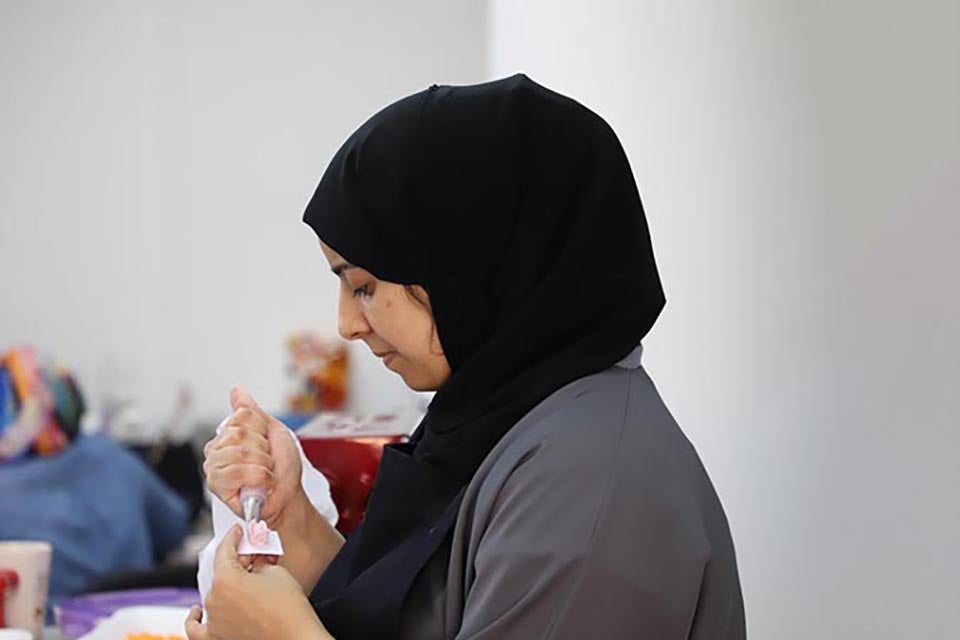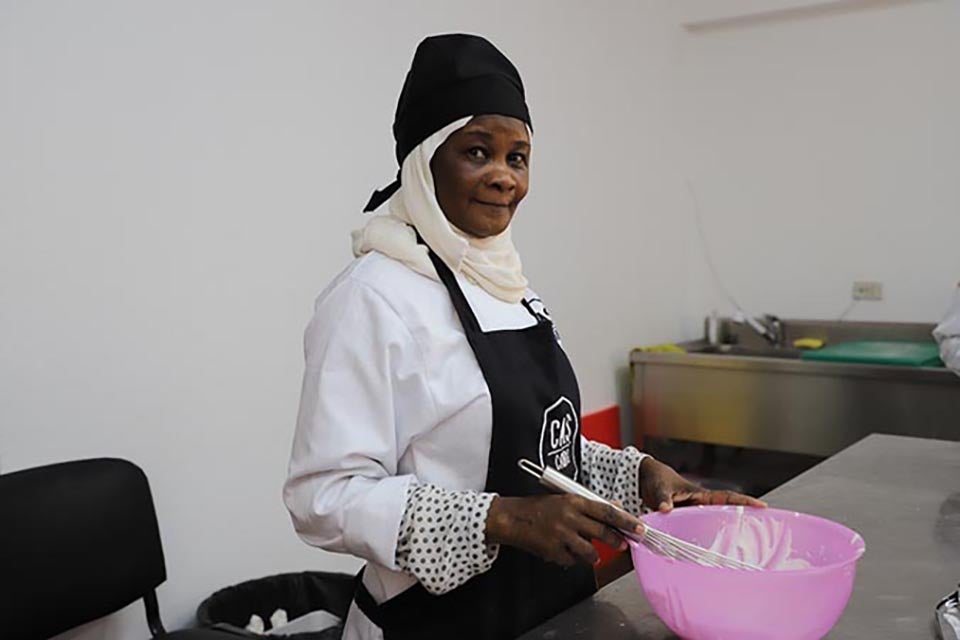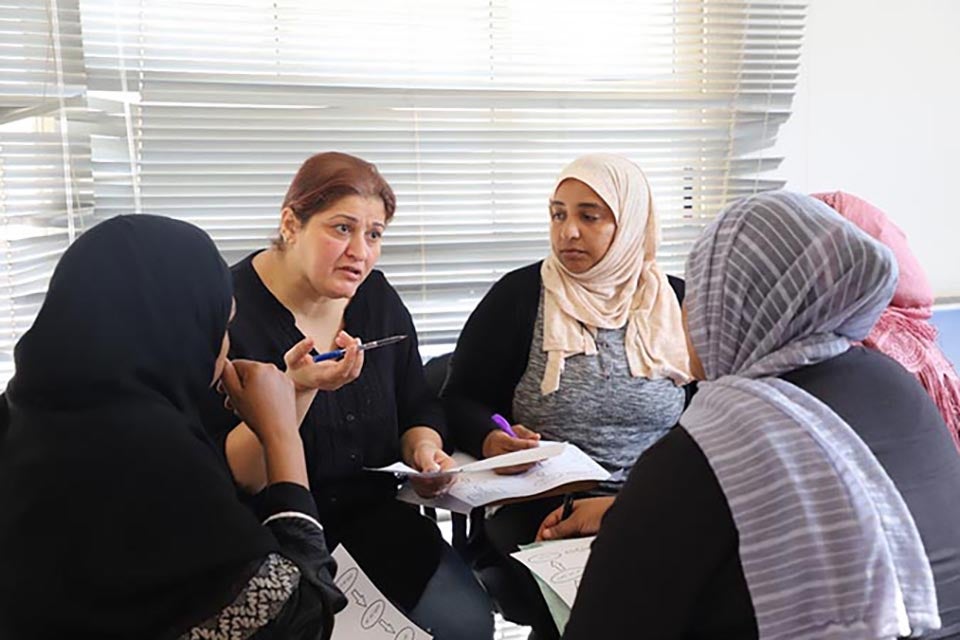From refugees to master chefs
Date:
With ongoing conflict and war around the world, people are on the move, migrating to escape danger and poverty and seeking better living conditions. Currently, Egypt hosts more than 252,000 registered refugees and asylum-seekers – and nearly half are girls and women (UNHCR, 2019). Refugee women and girls are one of the most vulnerable groups. Unable to access many protection and essential services, they are more prone to physical and sexual violence as well as economic hardship.
To establish long-term solutions, UN Women is working with refugee women and girls in Egypt to protect their rights, create employment opportunities and provide social support. Under its Women’s Leadership, Empowerment, Access & Protection in Crisis Response (LEAP) project, UN Women is providing vocational training for refugee women of all nationalities, as well as Egyptian women. The Vocational Training Programme includes Amigurumi for beginners, Advanced Amigurumi, Training of Trainers in Amigurumi, Mobile Repair, Secretary, Cooking and Cake Decoration Training , while also offering Career Guidance Training to help women cope with the challenges they face within the job market and make the best out of their working experience; whether through wage employment or private business.
We spent a day with women in different classes and saw how they learned different cake decoration techniques as how to create sugar flower while learning how to approach and resolve problems. Many women were eager to share their stories and tell us how the training has made an impact on their lives.
Heba Majdalani

Heba, a Palestinian/Syrian refugee, practices making sugar flowers. Photo: UN Women/Nada Ismail
“I am a Palestinian/Syrian. My family and I came to Egypt in 2012, and I’ve been here now for eight years. I married an Egyptian and we have a daughter.
I previously had some experience in baking and I used to make a few cakes for birthdays and parties, but I wanted to develop myself. Before I knew about the course, my husband and I were already thinking of opening a small bakery, but I wasn’t sure if the business would be a success. This course came to me at just the right time. It helped me master the skills I need and I can see a huge difference in my work. I now have the confidence to open my small business while I am one million per cent – not just 100 percent – sure of its success and of myself.”
Ikhlas El-Kheir

Ikhlas, a Sudanese refugee, takes part in a cooking class. Photo: UN Women/Nada Ismail
“I was a lawyer back in Sudan, but when I came to Egypt three years ago I felt lost and I couldn’t find any work. I was unemployed for an entire year. Before joining the course, I was working at a Sudanese restaurant but we rarely had any customers or orders. When I found out about this course, I was very insistent to join because I wanted to develop myself. Thankfully, I was enrolled and I am very happy to be here. I wake up at 6 am to prepare everything for my children and come here on time. I’m never late.
I’ve been practicing what I learned in the course and I invited my friends over to taste my food. I was very surprised by how much they liked it and the orders I started getting.
After finishing the course, I am planning on either starting my own small catering business at home or going back to the Sudanese restaurant and working on developing it.”
Elham Hassan

Elham, an Iraqi refugee, asks questions during the social counselling class. Photo: UN Women/Nada Ismail
“Before we left Iraq, the situation was dire and extremely dangerous. My daughter was in the 3rd grade and a man tried to escape into her school, but a gang of men followed him and killed him in front of the students, and in front of my daughter. That is the main reason we left.
After we came to Egypt, we were afraid of everything and we couldn’t interact with people and the community around us. It’s hard that you are far from your family, but we feel welcomed here in Egypt. I love cooking and I worked at a restaurant for a while but I didn’t carry on as I did not have the required professional experience. One of my Syrian friends told me about this training programme so I enrolled in the cooking training and my daughter in the cake decoration.
Cooking at home is something and what I learnt at this course is a totally different story; the different techniques and how to make various sauces, sandwiches and even food presentation.
The Career Guidance Training teaches us how to adapt to our new life, how to avoid different problems when employed at a kitchen for instance and how to deal with different personalities. We cannot just sit around and cry and complain that we are refugees. No, we need to think more positively and learn how to cope with our situation where this social and psychological support is very important. This course is one of the most important things that has happened to me since I became a refugee. Now, I am more open to various nationalities and experiences through the trainings I receive here”
UN Women’s vocational training aims to provide refugee and Egyptian women with different skills to produce sellable products to help empower them economically. The LEAP project is implemented in partnership with the National Council for Women, UNHCR and CARE International in Egypt, and is generously supported by the Government of Japan.
Read Arabic